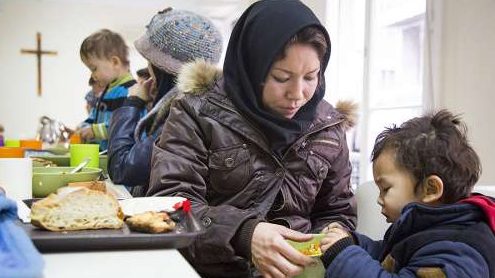People around the world have practiced solidarity during the pandemic, and they should do the same for refugees, Catholic humanitarian leaders said on World Refugee Day.
“COVID-19 has taught us an important lesson, the need for global solidarity to fight against any thing that affects humanity,” said Aloysius John, the secretary general for Caritas International, in advance of World Refugee Day on June 20.
“This year, 2020, must lead us to a new way of responding to the refugees and their plight,” he said.
While the U.S. has tightened its immigration policies during the new coronavirus pandemic, it should still be accepting refugees who are the most vulnerable, said Joan Rosenhauer, executive director of Jesuit Refugee Services/USA.
She noted that “with one in every 97 people displaced in our world, we must do more to respond.”
June 20 is annually observed as World Refugee Day. The UN’s refugee agency, UNHCR, was established in 1950 and has continued to operate through ongoing migration crises such as the decolonization of Africa, wars in Asia, Latin America, and the Balkans, and other conflicts and natural disasters.
The number of persons displaced around the world has reached a record high again at the end of 2019, with nearly 80 million people displaced from their homes around the world—an increase of almost 10 million from the previous year’s tally. The annual number of those displaced has nearly doubled in the last decade, when there were 41 million displaced in 2010.
Among these, 29.6 million are refugees, and 4.2 million are waiting on the outcome of their asylum claims, the UN says. Some of the displacement “hot spots” include the Democratic Republic of the Congo, the Sahel, Yemen, and Syria, which has had an ongoing civil war since 2011 which accounts for one-sixth of the global number of displaced. The crisis in Venezuela has also been particularly acute, the UN said.
The causes of displacement vary, but include sectarian conflicts, violence by extremist groups, religious persecution, and natural disasters—some caused by climate change—are also causing people to leave their homes, the UN says.
However, two-thirds of those displaced come from just five countries, Catholic Relief Services says: Syria, Venezuela, Afghanistan, South Sudan, and Burma.
And the current pandemic has only exacerbated the suffering of migrants and refugees, who are even more vulnerable due to a lack of access to proper housing, nutrition, and medical care, John said.
“On this day of the refugees, how can the international community turn deaf ears to the cries of these refugees and displaced who suffer in silence?” he asked.
With the number of displaced at an all-time high, he challenged Catholics to see the person behind the statistic.
“We seldom care about their stories of untold sufferings, of enduring pain, and above all stories of dehumanization wherein they people live in very precarious conditions,” he said. John urged governments to receive refugees safely, ensure their basic needs are met, and provide access to safe living conditions during the pandemic.

